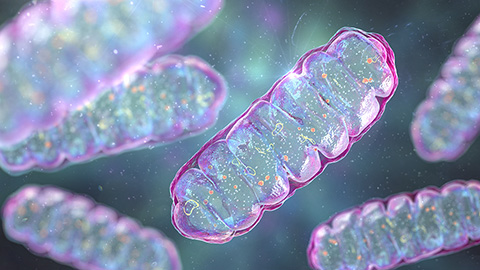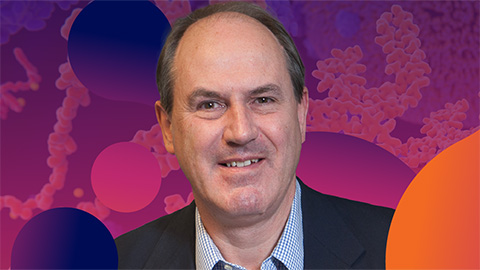Diabetes and cancer — how can one medicine treat both?
Each year, nearly 18 million patients worldwide get a cancer diagnosis and the disease causes about 10 million deaths. While researchers continue their quest to develop new, more effective treatments, they also study the anti-cancer properties of drugs prescribed for other disorders.
One such drug is metformin. Used as the first line of treatment for Type 2 diabetes since 1994, it helps patients maintain optimal blood glucose levels. The hormone insulin plays a vital role in the metabolism of glucose for energy. But in diabetes, cells can’t sense insulin well, so blood glucose levels rise. Metformin lowers these levels in three ways: by increasing insulin sensitivity, decreasing glucose production in the liver and increasing intestinal absorption of glucose.

The benefits of metformin extend beyond diabetes treatment, and many have called it a wonder drug. Almost 400 clinical trials registered now for cancer treatment are testing metformin. One study has associated long-term use of metformin with reduced cancer risk. Though this correlation is strong, researchers did not know how metformin inhibits cancer until now.
A recent article in the Journal of Biological Chemistry describes the mechanism by which metformin can suppress tumor formation. The research team from Fudan University in China was led by Xiaoying Li, one of the corresponding authors of this paper.
Cancers constantly need nutrients to support tumor growth and metastases, and to keep up with this high nutrient demand, cancer cell metabolism is altered. As a result, levels of gene products like mRNAs and proteins may differ between cancer and normal cells. To identify which genes are expressed differently, scientists use high-throughput screening methods. Li’s group used a similar technique to identify the genes affected by metformin treatment in cancer.
“When we screened for differentially expressed genes in tumor cells treated with metformin, the HMGCS1 gene, which makes a critical enzyme in the mevalonate pathway, came into our view,” Li said.
The mevalonate pathway is crucial for the production of biomolecules such as cholesterol, vitamin K, and steroid hormones, and HMGCS1 plays a key role in their production. Intermediates from the mevalonate pathway can serve as nutrients to spur tumor growth in multiple types of cancers. This study investigates HMGCS1 and the mevalonate pathway in liver and lung cancers.
Li’s team found that higher levels of HMGCS1 in cancer tissues correspond with poor prognosis and lower survival rates in patients. Subsequently, using mouse xenograft models, they found that metformin treatment can arrest tumor growth. The tumor arrest is at the level of transcription when a message coded in the DNA is copied into mRNA.
In cancer cells, metformin suppresses the transcription of the HMGCS1 gene by weakening the activity of its transcription activator, NRF2. The drug eventually lowers the level of the HMGCS1 enzyme and inhibits the mevalonate pathway, arresting tumor growth.
“This exciting finding happened by chance and led us to discover the complete story of the anti-tumor effect of metformin,” Li said.
The research team plans to continue their work and investigate whether combining metformin with statins, drugs that inhibit cholesterol biosynthesis, can enhance the anti-tumor effect further.
It can take decades for the government to approve cancer medications for use in patients, and even then these drugs can be expensive. If clinical trials for cancer treatment are successful, metformin’s longstanding safety profile and low cost will benefit patients.
Enjoy reading ASBMB Today?
Become a member to receive the print edition four times a year and the digital edition monthly.
Learn moreGet the latest from ASBMB Today
Enter your email address, and we’ll send you a weekly email with recent articles, interviews and more.
Latest in Science
Science highlights or most popular articles

From humble beginnings to unlocking lysosomal secrets
Monther Abu–Remaileh will receive the ASBMB’s 2026 Walter A. Shaw Young Investigator Award in Lipid Research at the ASBMB Annual Meeting, March 7-10 in Washington, D.C.

Chemistry meets biology to thwart parasites
Margaret Phillips will receive the Alice and C. C. Wang Award in Molecular Parasitology at the ASBMB Annual Meeting, March 7-10 in Washington, D.C.

ASBMB announces 2026 JBC/Tabor awardees
The seven awardees are first authors of outstanding papers published in 2025 in the Journal of Biological Chemistry.

Missing lipid shrinks heart and lowers exercise capacity
Researchers uncovered the essential role of PLAAT1 in maintaining heart cardiolipin, mitochondrial function and energy metabolism, linking this enzyme to exercise capacity and potential cardiovascular disease pathways.

Decoding how bacteria flip host’s molecular switches
Kim Orth will receive the Earl and Thressa Stadtman Distinguished Scientists Award at the ASBMB Annual Meeting, March 7–10, just outside of Washington, D.C.

Defining JNKs: Targets for drug discovery
Roger Davis will receive the Bert and Natalie Vallee Award in Biomedical Science at the ASBMB Annual Meeting, March 7–10, just outside of Washington, D.C.

